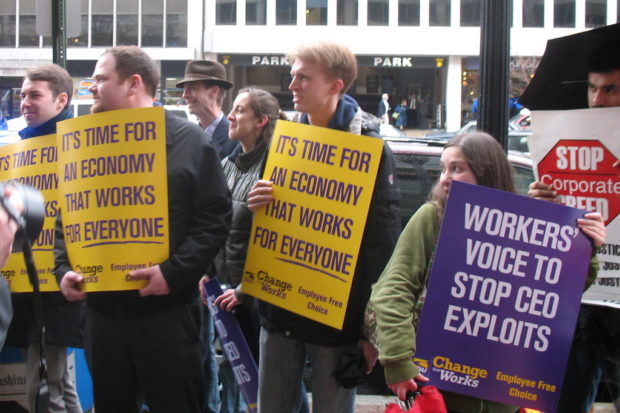
By: Mike Parker
A federal jury in San Francisco awarded damages to the Service Employees International Union (SEIU) on April 9 in its suit against the new National Union of Healthcare Workers (NUHW). After initial confusion about the award amount, it appears that the jury ordered a total of nearly $750,000 to SEIU and that the amount could come either from the new union or from 16 NUHW leaders who must pay amounts ranging from $30,000 to $75,000.
SEIU says the jury decision supports its charges that NUHW leaders were corrupt and dishonest. NUHW points to the fact that SEIU originally sought $25 million in damages and spent an estimated $10 million of its members’ money in legal fees to get this decision. Furthermore, SEIU had to drop charges against 12 of the original 28 leaders charged, as well as all of its claims about theft, sabotage and misappropriation.
So does the decision mean NUHW was just a little bit guilty of something big-or very guilty of something small? Neither. For those who believe unions should serve their members, this result is a vindication. The only thing the jury found NUHW leaders guilty of was trying to defend the members’ decisions against those of an autocratic international union.
A large part of the damages was awarded because the staff and officers of what was then SEIU’s giant United Healthcare Workers-West (UHW) local, based in Oakland, used staff time to fight the International’s decision to split the local. That fight was carried out openly and transparently. The membership understood it and approved it. In 2008, demonstrations of 5,000 and 8,000
members protested the splitting and the trusteeship of the local, respectively. In January 2009, a meeting of 5,000 stewards and shop floor leaders voted to reject the International’s ultimatum on the split.
Similarly, the International won its claim that it lost dues because UHW canceled contract extensions around that time. But local bargaining committees had approved the strategy of canceling extensions, which would give them the right to strike.
SEIU also won money to pay for the security guards it hired to protect the army of staff it sent in to take over the local.
There was no finding that any of the leaders used union resources to enrich themselves or their friends. In fact, in choosing to go with NUHW, many gave up well-paid union staff jobs to do volunteer work for the new union.
In real cases of corruption, SEIU has spent neither time nor resources to protect its members’ dues. Several recent corruption scandals have rocked the union. The president of a Los Angeles SEIU local, Tyrone Freeman, moved hundreds of thousands of dollars of union money to firms run by his wife. Annelle Grajeda, head of the California SEIU Council, was involved with making payments to her ex-boyfriend. At no time has SEIU tried to collect a return of Freeman’s or Grajeda’s staff salaries for not working in the members’ interests. In fact, Grajeda is now assistant to the International’s secretary-treasurer.
Play by the Rules?
We all know the law is biased in favor of corporations in labor disputes. In the same way, it is biased toward the rules made by the officials of labor organizations and against the membership. When we win victories in court for the members, it is usually because the leadership has gone way over the top in its arbitrariness, or maybe even violence, toward members.
If the union’s constitution says top leaders can make all the decisions, operate through sham conventions and punish members, then the courts recognize those as the rules.
The judge’s instructions in this case were that jurors could not consider whether the trusteeship or splitting the local was just. They could only consider whether the union reformers broke the rules written by SEIU International President Andy Stern. And, of course, what certainly did not get before the jury were the union issues that became the basis of the dispute-an international with a strategy of partnering with employers and shredding contract standards, against a view that unions grow when they defend their members.
NUHW says it will appeal the ruling to a higher court. The money its leaders have to pay will hurt. The verdict will require leaders to spend time raising funds instead of organizing. Far worse, it will have a chilling effect on others who want to take up the fight against a bureaucratic international.
But in the battle to win the hearts and minds of SEIU members who follow this conflict, SEIU has failed again. Its court case reinforced the fact that NUHW leaders’ only “crime” was to fight for the members against the International and that SEIU leaders are willing to blow members’ resources on retribution against democratic opposition.
A public airing of the fact that top union leaders can be so high-handed and pro management, spending great resources to defeat members’ wishes, doesn’t help any union organize. But NUHW leaders’ drive to fight tooth and nail to defend the union will probably end up helping the new union in its upcoming elections.
